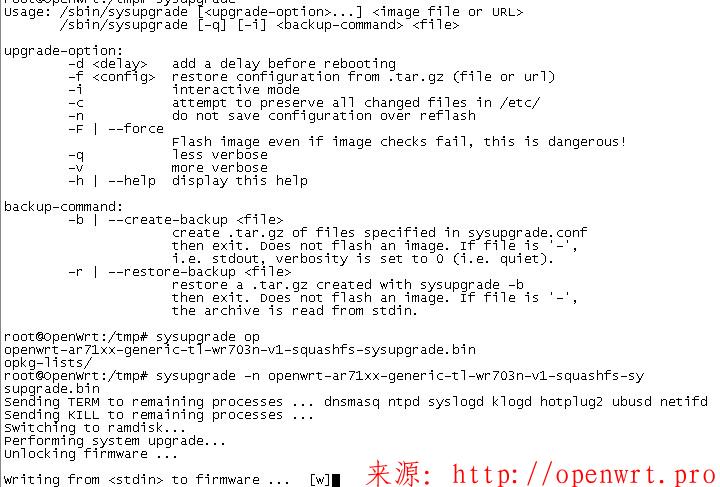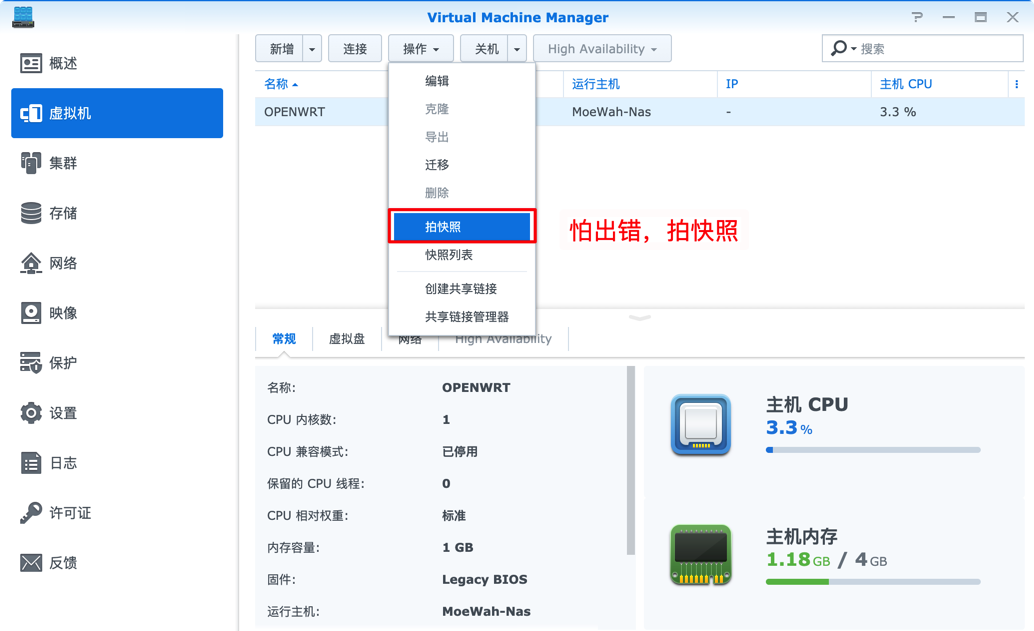UCI (统一配置接口) – 技术参考资料
-
UCI适用于OpenWrtR10367 (trunk)之后的版本
-
在本地GNU/Linux发行版上使用
git命令可获取源代码:
git clone git://nbd.name/uci.git
-
本文为UCI技术参考,UCI详细语法请参看 UCI(统一配置接口) – 使用手册
UCI是什么?
UCI 是一个用C语言编写的小应用程序(也可用作一个shell 脚本封装器),
其开发目的是集中管理一个OpenWrt设备内的所有配置选项.
UCI是对 OpenWrt历史版本White Russian上 NVRAM基础配置管理系统 的一个继承,
是一个对众多应用程序自带的标准配置文件的包装,
比如像: /etc/network/interfaces, /etc/exports, /etc/dnsmasq.conf, /etc/samba/samba.conf 等.
|
|
UCI配置文件位于目录 /etc/config/内,其在线访问文档在 OpenWrt-Wiki 之 UCI 配置文档. |
你可以用任意文本编辑器或命令行应用程序uci来修改它们,也可通过各种编程 API(如 Shell, Lua和C)来修改它们。
比如本WUILuCI – 技术参考就是使用Lua来管理它们。
UCI的依赖项
-
libuci一个用C语言写的UCI的小程序库
Both are maintained in the same git as UCI.
程序包
该功能主要由两个程序包uci和libuci提供. 程序包libuci-lua也能用到.
安装文件
uci
| 安装目录 | 文件类型 | 说明 |
|---|---|---|
| /sbin/uci | binary | uci的可执行文件 |
| /lib/config/uci.sh | shell script |
/sbin/uci的兼容Shell脚本封装
|
libuci
| 安装目录 | 文件类型e | 说明 |
|---|---|---|
| /lib/libuci.so | symlink | libuci.so.xxx的符号链接 |
| /lib/libuci.so.2011-01-19 | binary | 库文件 |
libuci-lua
| 安装目录 | 文件类型 | 说明 |
|---|---|---|
| /usr/lib/lua/uci.so | binary | 库文件 |
Lua绑定UCI
对于那些喜欢lua的人, 可以在代码中通过软件libuci-lua访问操控UCI. 只要安装了这个软件,然后在lua代码中运行
require("uci")
API
该 api 相当简单
顶层入口
uci.cursor() (实体化一个 uci 上下文实例) 例如
x = uci.cursor()或
x = uci.cursor(nil, "/var/state")如果你想包括状态值
这里你可以调用常用操作
x:get("config", "sectionname", "option")返回字符串 或 nil(没找到数据时)
x:set("config", "sectionname", "option", "value")设置简单的字符串变量
x:set("config", "sectionname", "option", { "foo", "bar" })设置列表变量
x:delete("config", "section", "option")删除选项
x:delete("config", "section")删除段
x:add("config", "type")adds new anon section "type" and returns its name
x:set("config", "name", "type")adds new section "name" with type "type"
x:foreach("config", "type", function(s) ... end)遍历所有类型为的"type"段,并以每个"s"为参数调用回调函数. s 是一个包含所有选型和两个特有属性的列表
-
s['.type'] → 段类型
-
s['.name'] → 段名称
如果回调函数返回 false [NB: not nil!], foreach() 在这个点会终止,不再继续遍历任何剩余的段.
如果至少存在一个段且回调函数没有产生错误,foreach() 会返回 true; 否则返回false.
x:reorder("config", "sectionname", position)Move a section to another position. Position starts at 0. This is for example handy to change the wireless config order (changing priority).
x:revert("config")discards any changes made to the configuration, that have not yet been committed
x:commit("config")commits (saves) the changed configuration to the corresponding file in /etc/config
That's basically all you need
UCI构架相关
花一点时间来理解 "section" 和 "type" 之间的差异是值得的. 让我们从一个例程开始:
#uci show system
system.@system[0]=system
system.@system[0].hostname=OpenWrt system.@system[0].timezone=UTC
system.@rdate[0]=rdate
system.@rdate[0].server=ac-ntp0.net.cmu.edu ptbtime1.ptb.de ac-ntp1.net.cmu.edu ntp.xs4all.nl ptbtime2.ptb.de cudns.cit.cornell.edu ptbtime3.ptb.de
这里, x:get("system","@rdate[0]","server") 将不正常工作. 因为 rdate 是个 type, 不是 section.
执行 x:get_all("system")的返回结果如下:
{ cfg02f02f={[".name"]="cfg02f02f",[".type"]="system",hostname="OpenWrt",[".index"]=0,[".anonymous"]=true,timezone="UTC"}, cfg04e10c={[".name"]="cfg04e10c",[".type"]="rdate",[".index"]=1,[".anonymous"]=true, server={"ac-ntp0.net.cmu.edu","ptbtime1.ptb.de","ac-tp1.net.cmu.edu","ntp.xs4all.nl","ptbtime2.ptb.de","cudns.cit.cornell.edu","ptbtime3.ptb.de"}} }
[".type"] 列出了段的类型 [".name"] 列出了段实际名称。这里可以看到,这些名称是系统生成的。 [".index"] 是列表的索引(+1)
据我所知,好像还没有办法直接访问"@rdate[0]"。你必须用x:foreach 迭代列出所给定类型的所有元素。 我一般用下面的函数:
uci=require("uci")
function getConfType(conf,type)
local curs=uci.cursor()
local ifce={}
curs:foreach(conf,type,function(s) ifce[s[".index"]]=s end)
return ifce
end
getConfType("system","rdate") 返回:
{{[".name"]="cfg04e10c",[".type"]="rdate",[".index"]=1,[".anonymous"]=true,
server={"ac-ntp0.net.cmu.edu","ptbtime1.ptb.de","ac-ntp1.net.cmu.edu","ntp.xs4all.nl","ptbtime2.ptb.de","cudns.cit.cornell.edu","ptbtime3.ptb.de"}}}
所以,如果你想修改system.@rdate[0].server,你需要迭代所需类型的段名([".name"]),然后调用x:set("system","cfg04e10c","server","zzz.com") 希望这对你有帮助 Sophana (不过, Luci有一个Cursor:get_first 函数实现了类似的功能, 不同的是他类型而不是段作为第二个参数.)
附加信息
另请参考 LuCI UCI model functions. 那是LuCI对CUI的用法。它用一些更简便的函数扩展了UCI指针类。
OpenWrt之外的用法
如果你想在OpenWrt之外使用libuci(例如:您正在计算机上用C语言开发一个应用程序),然后准备如下:
获取源代码:
git clone git://nbd.name/uci.git
转至源码目录(CMakeLists.txt所在的目录),并配置 build 为无Lua绑定:
cd uci/; cmake -D BUILD_LUA:BOOL=OFF .
编译并安装uci ALS根(这将吧uci安装到/usr/local/,请参阅如下主题,怎样在你的home目录下安装无root权限使用UCI: https://forum.openwrt.org/viewtopic.php?id=40547):
make install
打开 /etc/ld.so.conf, 并把你安装的uci库添加到这里:
vi /etc/ld.so.conf
在 /etc/ld.so.conf 某处添加这一行
/usr/local/lib
以root执行 ldconfig 来执行 /etc/ld.so.conf 的变化
ldconfig
To compile your application you have to link it against the uci library. Append -luci in your Makefile: 编译您的应用程序,你必须在您的Makefile文件中附加-luci以链接uci库:
$(CC) test.o -o test -luci
并且可以在这个页面找到如何在C中使用UCI的例程:https://forum.openwrt.org/viewtopic.php?pid=183335#p183335 更多的例程查你从git上克隆的开源的UCI源码目录,打开cli.c 或 ucimap-example.c文件
运行
所有的 uci set, uci add, uci rename 和 uci delete 命令 都是在/tmp中实现, 并用uci commit命令立即写入flash.
这明显不允许用户使用文本编辑器,而是使用应用uci的脚本,图形界面和其他应用程序.








